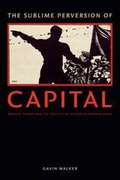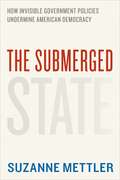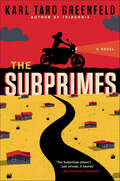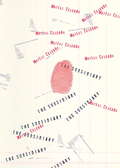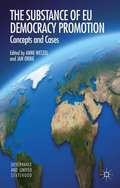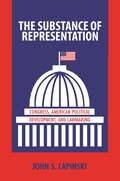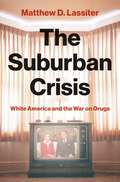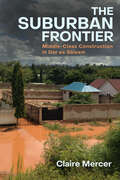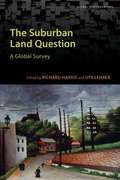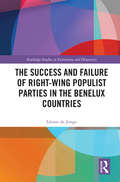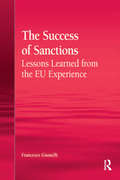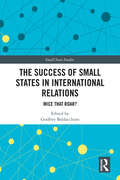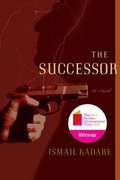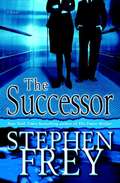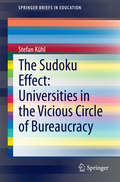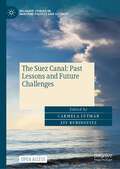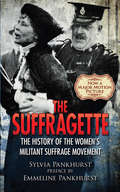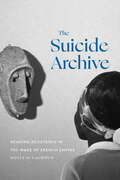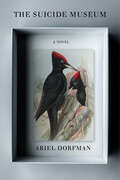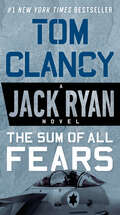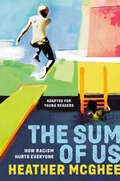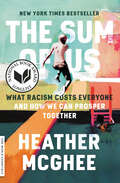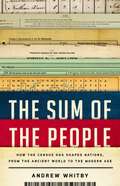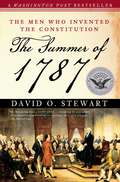- Table View
- List View
The Sublime Perversion of Capital: Marxist Theory and the Politics of History in Modern Japan
by Gavin WalkerIn The Sublime Perversion of Capital Gavin Walker examines the Japanese debate about capitalism between the 1920s and 1950s, using it as a "prehistory" to consider current discussions of uneven development and contemporary topics in Marxist theory and historiography. Walker locates the debate's culmination in the work of Uno Kozo, whose investigations into the development of capitalism and the commodification of labor power are essential for rethinking the national question in Marxist theory. Walker's analysis of Uno and the Japanese debate strips Marxist historiography of its Eurocentric focus, showing how Marxist thought was globalized from the start. In analyzing the little-heralded tradition of Japanese Marxist theory alongside Marx himself, Walker not only offers new insights into the transition to capitalism, the rise of globalization, and the relation between capital and the formation of the nation-state; he provides new ways to break Marxist theory's impasse with postcolonial studies and critical theory.
The Submerged State
by Suzanne Mettler“Keep your government hands off my Medicare!” Such comments spotlight a central question animating Suzanne Mettler’s provocative and timely book: why are many Americans unaware of government social benefits and so hostile to them in principle, even though they receive them? The Obama administration has been roundly criticized for its inability to convey how much it has accomplished for ordinary citizens. Mettler argues that this difficulty is not merely a failure of communication; rather it is endemic to the formidable presence of the “submerged state. ” In recent decades, federal policymakers have increasingly shunned the outright disbursing of benefits to individuals and families and favored instead less visible and more indirect incentives and subsidies, from tax breaks to payments for services to private companies. These submerged policies, Mettler shows, obscure the role of government and exaggerate that of the market. As a result, citizens are unaware not only of the benefits they receive, but of the massive advantages given to powerful interests, such as insurance companies and the financial industry. Neither do they realize that the policies of the submerged state shower their largest benefits on the most affluent Americans, exacerbating inequality. Mettler analyzes three Obama reforms—student aid, tax relief, and health care—to reveal the submerged state and its consequences, demonstrating how structurally difficult it is to enact policy reforms and even to obtain public recognition for achieving them. She concludes with recommendations for reform to help make hidden policies more visible and governance more comprehensible to all Americans. The sad truth is that many American citizens do not know how major social programs work—or even whether they benefit from them. Suzanne Mettler’s important new book will bring government policies back to the surface and encourage citizens to reclaim their voice in the political process.
The Submerged State: How Invisible Government Policies Undermine American Democracy (Chicago Studies In American Politics Ser.)
by Suzanne Mettler“Keep your government hands off my Medicare!” Such comments spotlight a central question animating Suzanne Mettler’s provocative and timely book: why are many Americans unaware of government social benefits and so hostile to them in principle, even though they receive them? The Obama administration has been roundly criticized for its inability to convey how much it has accomplished for ordinary citizens. Mettler argues that this difficulty is not merely a failure of communication; rather it is endemic to the formidable presence of the “submerged state.” In recent decades, federal policymakers have increasingly shunned the outright disbursing of benefits to individuals and families and favored instead less visible and more indirect incentives and subsidies, from tax breaks to payments for services to private companies. These submerged policies, Mettler shows, obscure the role of government and exaggerate that of the market. As a result, citizens are unaware not only of the benefits they receive, but of the massive advantages given to powerful interests, such as insurance companies and the financial industry. Neither do they realize that the policies of the submerged state shower their largest benefits on the most affluent Americans, exacerbating inequality. Mettler analyzes three Obama reforms—student aid, tax relief, and health care—to reveal the submerged state and its consequences, demonstrating how structurally difficult it is to enact policy reforms and even to obtain public recognition for achieving them. She concludes with recommendations for reform to help make hidden policies more visible and governance more comprehensible to all Americans. The sad truth is that many American citizens do not know how major social programs work—or even whether they benefit from them. Suzanne Mettler’s important new book will bring government policies back to the surface and encourage citizens to reclaim their voice in the political process.
The Subprimes: A Novel
by Karl Taro GreenfeldA wickedly funny dystopian parody set in a financially apocalyptic future America, from the critically acclaimed author of Triburbia.In a future America that feels increasingly familiar, you are your credit score. Extreme wealth inequality has created a class of have-nothings: Subprimes. Their bad credit ratings make them unemployable. Jobless and without assets, they’ve walked out on mortgages, been foreclosed upon, or can no longer afford a fixed address. Fugitives who must keep moving to avoid arrest, they wander the globally warmed American wasteland searching for day labor and a place to park their battered SUVs for the night.Karl Taro Greenfeld’s trenchant satire follows the fortunes of two families whose lives reflect this new dog-eat-dog, survival-of-the-financially-fittest America. Desperate for work and food, a Subprime family has been forced to migrate east, hoping for a better life. They are soon joined in their odyssey by a writer and his family—slightly better off, yet falling fast. Eventually, they discover a small settlement of Subprimes who have begun an agrarian utopia built on a foreclosed exurb. Soon, though, the little stability they have is threatened when their land is targeted by job creators for shale oil extraction.But all is not lost. A hero emerges, a woman on a motorcycle—suspiciously lacking a credit score—who just may save the world.In The Subprimes, Karl Taro Greenfeld turns his keen and unflinching eye to our country today—and where we may be headed. The result is a novel for the 99 percent: a darkly funny comedy about paradise lost and found, the value of credit, economic policy, and the meaning of family.
The Subsidiary
by Samuel Rutter Matias Celedon"This is a book written in stamps. And it works: the form perfectly emulates the gloomy atmosphere of the subsidiary and the broken emotional environment of its employees. With few words, The Subsidiary says a great deal." --La PolleraIn the subsidiary offices of a major corporation, the power suddenly goes out: the lights switch off; the doors lock; the phone lines go dead. The employees are trapped in total darkness with only cryptic, intermittent announcements over the loud speaker, instructing all personnel to remain at their work stations until further notice.Terrified, one lone worker uses the implements on his desk to give testimony to the horrors that occur during the days he spends trapped in the building, testimony told exclusively --- and hauntingly --- through the stamps he uses to mark corporate documents. Hand-designed by the author with a stamp set he bought in an bookstore in Santiago, Matías Celedón's The Subsidiary is both an exquisite object and a chilling avant-garde tale from one of Chile's rising literary stars.From the Hardcover edition.
The Substance of EU Democracy Promotion
by Anne Wetzel Jan OrbieThe book investigates the substance of the European Union's (EU) democracy promotion policy. It focuses on elections, civil and political rights, horizontal accountability, effective power to govern, stateness, state administrative capacity, civil society, and socio-economic context as components of embedded liberal democracy.
The Substance of Representation: Congress, American Political Development, and Lawmaking (Princeton Studies in American Politics: Historical, International, and Comparative Perspectives #133)
by John S. LapinskiLawmaking is crucial to American democracy because it completely defines and regulates the public life of the nation. Yet despite its importance, political scientists spend very little time studying the direct impact that the politics surrounding a particular issue has on lawmaking. The Substance of Representation draws on a vast range of historical and empirical data to better understand how lawmaking works across different policy areas. Specifically, John Lapinski introduces a theoretically grounded method for parsing policy issues into categories, and he shows how policymaking varies in predictable ways based on the specific issue area being addressed. Lapinski examines the ways in which key factors that influence policymaking matter for certain types of policy issues, and he includes an exhaustive look at how elite political polarization shifts across these areas. He considers how Congress behaves according to the policy issue at hand, and how particular areas--such as war, sovereignty issues, and immigration reform--change legislative performance. Relying on records of all Congressional votes since Reconstruction and analyzing voting patterns across policy areas from the late nineteenth to late twentieth centuries, Lapinski provides a comprehensive historical perspective on lawmaking in order to shed light on current practices. Giving a clear picture of Congressional behavior in the policymaking process over time, The Substance of Representation provides insights into the critical role of American lawmaking.
The Suburban Crisis: White America and the War on Drugs
by Matthew D. LassiterHow the drug war transformed American political cultureSince the 1950s, the American war on drugs has positioned white middle-class youth as sympathetic victims of illegal drug markets who need rehabilitation instead of incarceration whenever they break the law. The Suburban Crisis traces how politicians, the media, and grassroots political activists crusaded to protect white families from perceived threats while criminalizing and incarcerating urban minorities, and how a troubling legacy of racial injustice continues to inform the war on drugs today.In this incisive political history, Matthew Lassiter shows how the category of the “white middle-class victim” has been as central to the politics and culture of the drug war as racial stereotypes like the “foreign trafficker,” “urban pusher,” and “predatory ghetto addict.” He describes how the futile mission to safeguard and control white suburban youth shaped the enactment of the nation’s first mandatory-minimum drug laws in the 1950s, and how soaring marijuana arrests of white Americans led to demands to refocus on “real criminals” in inner cities. The 1980s brought “just say no” moralizing in the white suburbs and militarized crackdowns in urban centers.The Suburban Crisis reveals how the escalating drug war merged punitive law enforcement and coercive public health into a discriminatory system for the social control of teenagers and young adults, and how liberal and conservative lawmakers alike pursued an agenda of racialized criminalization.
The Suburban Frontier: Middle-Class Construction in Dar es Salaam
by Claire MercerA free ebook version of this title is available through Luminos, University of California Press’s Open Access publishing program. Visit www.luminosoa.org to learn more. African cities are under construction. Beyond the urban redevelopment schemes and large-scale infrastructure projects reconfiguring central city skylines, urban residents are putting their resources into finding land and building homes on city edges. The Suburban Frontier examines how self-built housing on the urban periphery has become central to middle-class formation and urban transformation in contemporary Tanzania. Drawing on original research in the city of Dar es Salaam, Claire Mercer details how the "suburban frontier" has become the place where Africa’s middle classes are shaped. As the first book-length analysis of Africa’s suburban middle class, The Suburban Frontier offers significant contributions to the study of urban social change in Africa and urbanization in the Global South.
The Suburban Land Question: A Global Survey (Global Suburbanisms)
by Richard Harris Ute LehrerAs part of the urbanization process, suburban development involves the conversion of rural land to urban use. When discussing the suburbs, most writers focus on particular countries in the northern hemisphere, implying that patterns and processes elsewhere are fundamentally different. The purpose of The Suburban Land Question is to identify the common elements of suburban development, focusing on issues associated with the scale and pace of rapid urbanization around the world. Editors Richard Harris and Ute Lehrer and a diverse group of contributors draw on a variety of sources, including official data, planning documents, newspapers, interviews, photographs, and field observations to explore the pattern, process, and planning of suburban land development. Featuring case studies from major world regions, including China, India, Latin America, South Africa, as well as France, Austria, the Netherlands, the United States, and Canada, the volume identifies and discusses the peculiarly transitional character of suburban land. In addition to place and time, The Suburban Land Question addresses the many elements that distinguish land development in urban fringe areas, including economy, social infrastructure, and legality.
The Success and Failure of Right-Wing Populist Parties in the Benelux Countries (Routledge Studies in Extremism and Democracy)
by Léonie de JongeThis book focuses on the varied support for the populist radical right in the Benelux countries: Belgium, the Netherlands and Luxembourg. Despite many common characteristics, right-wing populist parties have historically been more successful in the Netherlands and Flanders than in Luxembourg and Wallonia. This book argues that the variation in the success of right-wing populist parties depends to a large extent on the way in which they are perceived and received in a given polity. In the Netherlands and Flanders, mainstream parties and the media have contributed to politicising issues pertaining to immigration and national identity, thereby tilling the field for the populist radical right. In Luxembourg and Wallonia, mainstream parties and the media have resolutely limited the opportunities for right-wing populist challengers to influence the public debate. This volume will be of interest to practitioners as well as students and scholars of party politics, the media, the populist radical right and the Benelux region.
The Success of Sanctions: Lessons Learned from the EU Experience
by Francesco GiumelliThe effectiveness of sanctions cannot purely be measured by the way they change the behaviour of their intended target. The degree to which sanctions constrain a rogue state's behaviour and the signals they send to future targets should also be prime considerations. In this thought provoking book Francesco Giumelli measures the true effectiveness of EU sanctions against a range of states including Belarus, Zimbabwe, Moldova, Uzbekistan, the USA and China. He demonstrates that focussing purely on behavioural change is limiting, especially when considering the actions and motivations of an international organisation, and develops a process to evaluate the direct and indirect impact of EU sanctions. Giumelli demonstrates the many different ways sanctions have been used by the EU to produce positive direct and indirect results and provides a multi-level framework to assess the success of sanctions in the future.
The Success of Small States in International Relations: Mice that Roar? (Small State Studies)
by Godfrey BaldacchinoThe Success of Small States in International Relations highlights the normality and power of small states in international relations. This book overturns the stereotype that small states, however defined, are weak and are, or ought to be, consigned to the margins of international relations. It argues that small states are not ‘punching above their weight’, or even anomalies – since it is large states which are the anomaly in the global system. The text unpacks the nature and character of small state success, while also looking critically at thirteen episodes in modern history where small states, singly or collectively, emerged victorious in confrontations with larger states. The case studies, globally sourced, are bookended by conceptual and analytic reviews of what these events mean for diplomacy, international relations and small states more generally. This book will appeal to scholars and students of comparative political science and international relations, particularly from small states, as well as policy makers and senior small state government officers.
The Successor
by Ismail Kadare David Bellos Tedi PapavramiA new novel from the acclaimed winner of the inaugural Man Booker International Prize for achievement in fiction. The Successor is a powerful political novel based on the sudden, mysterious death of the man who had been handpicked to succeed the hated Albanian dictator Enver Hoxha. The man who died was Mehmet Shehu, the presumed heir to the ailing dictator. The world was so certain that he was next in line that he was known as The Successor. And then, shortly before he was to assume power, he was found dead. Did he commit suicide or was he murdered? The Successor is simultaneously a page-turning mystery, a historical novel - based on actual events and buttressed by the author's private conversations with the son of the real-life Mehmet Shehu - and a psychological challenge to the reader to decide, How does one live when nothing is sure? The Successor seamlessly blends dream and reality, legendary past, and contemporary history, and proves again that Kadare stands alongside Marquez, Canetti, and Auster.
The Successor (Christian Gillette #4)
by Stephen FreyMake-or-break decisions involving millions of dollars are all in a day's work for Christian Gillette, chairman of Everest Capital, New York's most renowned private equity firm. He's taken on the toughest, most powerful, and often most dangerous adversaries and prevailed--all the while honing his skill for being cool under fire, literally. But now Gillette will be put to the ultimate test. He's offered the chance to seal a deal unlike any other, one that goes beyond boardrooms, balance sheets, and even Everest itself-one that will leave its mark on history. Gillette is no stranger to Jesse Wood, the first African American president of the United States, having been Wood's chosen running mate in his historic bid for the White House. Though still slightly upset over being dropped from the ticket at the eleventh hour, Gillette's not about to ignore the chief executive's summons to a top-secret meeting at Camp David. There, Wood drops a bombshell: The president of Cuba is dead. Cuba's communist regime has kept the dictator's demise hush while it races to fill the power vacuum. And the United States is poised to support a cabal of Cuban professionals plotting a coup. The President wants Gillette to meet with the conspirators and size up the chances for a successful capitalist revolution. But by no means can his mission be traced back to the White House. If anything goes wrong, Gillette is on his own. And if certain people have their way, something will go wrong. For the conspiracy to liberate Cuba isn't the only one afoot. Enemies in high places, who will go to any lengths to wreak revenge on Gillette and to unseat President Wood, have set in motion a campaign of deception, sabotage, and murder whose shockwaves will resonate from the streets of Havana to the Oval Office. But for Gillette, who has just named his alluring and ambitious protégé, Allison Wallace, as his successor at Everest, the greatest peril may lie much closer to home. The Successor is blue-chip Stephen Frey, marshaling his flawless instincts for edgy, provocative, breathtaking suspense with a master's touch.
The Sudoku Effect: Universities in the Vicious Circle of Bureaucracy
by Stefan KühlThis book shows that the introduction of the European Credit Transfer System (ECTS) of credit points as a new accounting unit at universities has led to increased bureaucracy and the schoolmaster-style regimentation of Bachelor's and Master's courses. It explains how, due to the pressure of having to plan every single working hour of studying in advance, a 'Sudoku Effect' is created by the necessity to combine courses, exams and modules in such a way that the points 'add up'. An unintentional side effect of the introduction of the ECTS, the Sudoku Effect has led to more classroom style teaching, an inflation of exams and fewer choices available to students. It has resulted in such complex and contradictory guidelines for the planning of the curriculum that the values attributed to the higher education reform can often only be realised if the rules for Bachelor's and Master's programmes are ignored, or at least stretched, in practice. The book describes how the reaction to this situation is the continuous further refinement of the complicated rules rather than their abolishment.
The Suez Canal: Past Lessons and Future Challenges (Palgrave Studies in Maritime Politics and Security)
by Carmela Lutmar Ziv RubinovitzThis open access book seeks to provide a survey of historical, geopolitical, economic, and environmental developments in the last 150 years and to highlight future challenges it faces as it pertains to the areas mentioned earlier. It argues that the centrality of the canal—geo-strategically and otherwise—requires a shift in scholarly focus to study the various aspects from an interdisciplinary perspective. This book addresses several gaps in the literature—the first being a lack of a systematic examination of historical aspects in the development of the canal in 150 years. The second is a careful study of the canal’s geostrategic importance. The third is a combination of several disciplines that examine the centrality of the Suez Canal.
The Suffragette: The History of the Women's Militant Suffrage Movement
by Sylvia Pankhurst Emmeline PankhurstBy 1903, more than fifty years of peaceful campaigning had brought British women no closer to attaining the right to vote. In that year activist Emmeline Pankhurst founded the Women's Social and Political Union, a militant organization dedicated to achieving women's suffrage. The union's motto, "Deeds not words," reflected its radical approach, consisting of stone-throwing, window-breaking, arson, and physical confrontation with authorities.The Suffragette, written by Emmeline Pankhurst's daughter, Sylvia, offers an insider's perspective on the union's growth and development as well as the motives and ideals that inspired its leaders and followers. She chronicles the protesters' tactics as well as the consequences of their actions: arrests, imprisonment, hunger strikes, and the mental and physical ordeals of forced feeding. Vintage photographs illustrate the demonstrations, courtroom trials, and other dramatic incidents from the history of the women's militant suffrage movement.
The Suicide Archive: Reading Resistance in the Wake of French Empire
by Doyle D. CalhounThroughout the French empire, from the Atlantic and the Caribbean to West and North Africa, men, women, and children responded to enslavement, colonization, and oppression through acts of suicide. In The Suicide Archive, Doyle D. Calhoun charts a long history of suicidal resistance to French colonialism and neocolonialism, from the time of slavery to the Algerian War for Independence to the “Arab Spring.” Noting that suicide was either obscured in or occluded from French colonial archives, Calhoun turns to literature and film to show how aesthetic forms and narrative accounts can keep alive the silenced histories of suicide as a political language. Drawing on scientific texts, police files, and legal proceedings alongside contemporary African and Afro-Caribbean novels, film, and Senegalese oral history, Calhoun outlines how such aesthetic works rewrite histories of resistance and loss. Consequently, Calhoun offers a new way of writing about suicide, slavery, and coloniality in relation to literary history.
The Suicide Museum: A Novel
by Ariel DorfmanA billionaire Holocaust survivor hires a writer to uncover the truth of Salvador Allende&’s death, and they must confront their own dark histories to find a path forward—for themselves and for our ravaged planet. An expansive, engrossing mystery for fans of Gabriel García Márquez, Margaret Atwood, and Bill McKibben, from the acclaimed author of Death and the Maiden.Ariel needed money, and Joseph Hortha had it. Bound by gratitude toward the late Chilean president and a persistent need to know whether murder or suicide ended his life during the 1973 coup, the two men embark on an investigation that will take them from Washington DC and New York, to Santiago and Valparaíso, and finally to London. They encounter an unforgettable cast of characters: a wedding photographer who can predict a couple&’s future; a policeman in pursuit of the serial killer targeting refugees; a revolutionary caught trying to assassinate a dictator; and, above all, the complex women who support them along the way, for their own obscure reasons. Before Ariel and Joseph can resolve a quest full of dangers and enigmas, they must help each other come to terms with guilt and trauma from personal catastrophes hidden deep in the past. What begins as an intriguing literary caper unfolds into a propulsive, philosophical saga about love, family, machismo, fascism, and exile that asks what we owe the world, one another, and ourselves. By boldly mixing fiction and reality, imagination and history, The Suicide Museum explores the limits of the novelistic genre, expanding it in an unsuspected and exceptional way.
The Sum of All Fears (A Jack Ryan Novel #5)
by Tom ClancyDon't Miss the Original Series Tom Clancy's Jack Ryan Starring John Krasinski!The search for a stolen nuclear weapon on American soil sends Jack Ryan on a dangerous mission with global consequences in this #1 New York Times bestselling thriller.Peace may finally be at hand in the Middle East, as Jack Ryan, Deputy Director of Intelligence for the CIA, lays the groundwork for a plan that could end centuries of conflict. But ruthless terrorists have a final, desperate card to play: a nuclear weapon hidden somewhere in the United States.With one terrible act, distrust mounts, forces collide, and the floundering U.S. president seems unable to cope with the crisis. With the world on the verge of nuclear disaster, Ryan must frantically seek a solution—before the chiefs of state lose control of themselves and the world.
The Sum of Us (Adapted for Young Readers): How Racism Hurts Everyone
by Heather McGheeThe New York Times bestseller, now adapted for a new generation of young readers, leaders, thinkers, and activists. A groundbreaking call to action that examines how racism affects and harms all of us and how we need to face it head-on, together.The future can be prosperous for everyone, but only if we address the problems of racial and economic inequality.McGhee believes that all people, of all ages and all backgrounds, need to rethink their attitude toward race and strive together to create opportunities that benefit everyone. This book is a call to action. McGhee examines how damaging racism is, not only to people of color but also to white people. She offers hope and real solutions so we can all prosper. An expert in economic policy, McGhee draws lessons both from her work at a think tank and from her travels around the country talking to everyday Americans fighting for a more just and inclusive society.The people she meets prove how the stories we tell ourselves about race and belonging influence the policies that determine our shared economic future.The Sum of Us provides hope that with understanding and open-mindedness, the world can be more united and equitable than it is today.
The Sum of Us: What Racism Costs Everyone and How We Can Prosper Together
by Heather McGheeOne of today’s most insightful and influential thinkers offers a powerful exploration of inequality and the lesson that generations of Americans have failed to learn: Racism has a cost for everyone—not just for people of color. <P><P>Heather McGhee’s specialty is the American economy—and the mystery of why it so often fails the American public. From the financial crisis to rising student debt to collapsing public infrastructure, she found a common root problem: racism. But not just in the most obvious indignities for people of color. Racism has costs for white people, too. It is the common denominator of our most vexing public problems, the core dysfunction of our democracy and constitutive of the spiritual and moral crises that grip us all. But how did this happen? And is there a way out? McGhee embarks on a deeply personal journey across the country from Maine to Mississippi to California, tallying what we lose when we buy into the zero-sum paradigm—the idea that progress for some of us must come at the expense of others. Along the way, she meets white people who confide in her about losing their homes, their dreams, and their shot at better jobs to the toxic mix of American racism and greed. This is the story of how public goods in this country—from parks and pools to functioning schools—have become private luxuries; of how unions collapsed, wages stagnated, and inequality increased; and of how this country, unique among the world’s advanced economies, has thwarted universal healthcare. But in unlikely places of worship and work, McGhee finds proof of what she calls the Solidarity Dividend: gains that come when people come together across race, to accomplish what we simply can’t do on our own. <P><P>The Sum of Us is a brilliant analysis of how we arrived here: divided and self-destructing, materially rich but spiritually starved and vastly unequal. McGhee marshals economic and sociological research to paint an irrefutable story of racism’s costs, but at the heart of the book are the humble stories of people yearning to be part of a better America, including white supremacy’s collateral victims: white people themselves. With startling empathy, this heartfelt message from a Black woman to a multiracial America leaves us with a new vision for a future in which we finally realize that life can be more than a zero-sum game. <P><P><b>A New York Times Bestseller</b>
The Sum of the People: How the Census Has Shaped Nations, from the Ancient World to the Modern Age
by Andrew WhitbyThis fascinating three-thousand-year history of the census traces the making of the modern survey and explores its political power in the age of big data and surveillance.In April 2020, the United States will embark on what has been called "the largest peacetime mobilization in American history": the decennial population census. It is part of a tradition of counting people that goes back at least three millennia and now spans the globe.In The Sum of the People, data scientist Andrew Whitby traces the remarkable history of the census, from ancient China and the Roman Empire, through revolutionary America and Nazi-occupied Europe, to the steps of the Supreme Court. Marvels of democracy, instruments of exclusion, and, at worst, tools of tyranny and genocide, censuses have always profoundly shaped the societies we've built. Today, as we struggle to resist the creep of mass surveillance, the traditional census -- direct and transparent -- may offer the seeds of an alternative.
The Summer of 1787
by David O. StewartThe successful creation of the Constitution is a suspense story. The Summer of 1787 takes us into the sweltering room in which delegates struggled for four months to produce the flawed but enduring document that would define the nation -- then and now. George Washington presided, James Madison kept the notes, Benjamin Franklin offered wisdom and humor at crucial times. The Summer of 1787traces the struggles within the Philadelphia Convention as the delegates hammered out the charter for the world's first constitutional democracy. Relying on the words of the delegates themselves to explore the Convention's sharp conflicts and hard bargaining, David O. Stewart lays out the passions and contradictions of the often painful process of writing the Constitution. It was a desperate balancing act. Revolutionary principles required that the people have power, but could the people be trusted? Would a stronger central government leave room for the states? Would the small states accept a Congress in which seats were alloted according to population rather than to each sovereign state? And what of slavery? The supercharged debates over America's original sin led to the most creative and most disappointing political deals of the Convention. The room was crowded with colorful and passionate characters, some known -- Alexander Hamilton, Gouverneur Morris, Edmund Randolph -- and others largely forgotten. At different points during that sultry summer, more than half of the delegates threatened to walk out, and some actually did, but Washington's quiet leadership and the delegates' inspired compromises held the Convention together. In a country continually arguing over the document's original intent, it is fascinating to watch these powerful characters struggle toward consensus -- often reluctantly -- to write a flawed but living and breathing document that could evolve with the nation.
